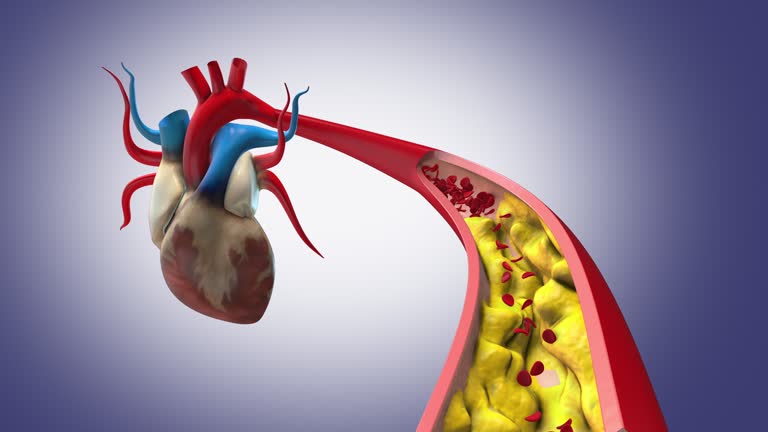How Angioplasty Can Save Your Heart: Benefits and Recovery Process in Jaipur

Strong 8k brings an ultra-HD IPTV experience to your living room and your pocket.
Heart disease remains one of the leading causes of death worldwide, and in India, it is a significant concern. Coronary artery disease (CAD), which occurs when the coronary arteries become narrowed or blocked due to plaque buildup, is a major contributor to heart attacks. Fortunately, angioplasty is a highly effective procedure that can treat CAD and save lives by restoring proper blood flow to the heart. If you or a loved one is facing heart disease, understanding how angioplasty works, its benefits, and what to expect during recovery can help make informed decisions about your heart health. In Jaipur, patients have access to top-tier medical facilities and experienced specialists, including leading angioplasty doctors like Dr. Ankit Gupta at Healthy Heart Clinic.
What is Angioplasty?
Angioplasty, also known as percutaneous coronary intervention (PCI), is a minimally invasive procedure used to open blocked or narrowed coronary arteries. The goal is to restore normal blood flow to the heart muscle, reducing the risk of heart attacks and improving heart function. During the procedure, a catheter is inserted through a small incision, often in the wrist or groin, and guided to the site of the blockage. A balloon at the tip of the catheter is then inflated to compress the plaque and widen the artery. In many cases, a stent (a small mesh tube) is placed to keep the artery open.
Why is Angioplasty Necessary?
Angioplasty is usually recommended for patients with significant coronary artery disease or those who have experienced a heart attack or severe angina (chest pain caused by restricted blood flow). The blockage in the coronary arteries can restrict the flow of oxygen-rich blood to the heart, leading to symptoms such as:
- Chest pain (Angina): A feeling of pressure or tightness in the chest.
- Shortness of breath: Difficulty breathing or feeling winded during physical activity.
- Fatigue: Feeling excessively tired due to insufficient blood flow to the heart.
- Heart attack risk: Blocked arteries can result in a heart attack, a life-threatening event that requires immediate medical attention.
If you experience any of these symptoms, it's crucial to consult with an Interventional Cardiologist in Jaipur for timely intervention, including angioplasty.
How Angioplasty Can Save Your Heart
- Restores Blood Flow to the Heart
The most significant benefit of angioplasty is that it restores blood flow to the heart muscle. When the coronary arteries are blocked, the heart does not receive enough oxygenated blood, which can lead to muscle damage and increase the risk of a heart attack. By clearing the blockages, angioplasty allows the heart to function more efficiently, reducing the risk of severe heart problems.
2. Prevents Heart Attacks
Angioplasty is often performed during or after a heart attack to quickly restore blood flow to the heart. A blockage that causes a heart attack can be removed by angioplasty, preventing further damage to the heart muscle. Timely angioplasty is critical in reducing the severity of a heart attack and improving outcomes for patients.
3. Relieves Symptoms of Angina
For many patients with coronary artery disease, chest pain or discomfort, known as angina, is a significant symptom. Angina occurs when the heart's demand for oxygenated blood exceeds the supply due to a blockage in the arteries. Angioplasty can alleviate angina by opening up the blocked arteries, providing the heart with the blood it needs to function optimally. This leads to improved quality of life, as patients no longer experience the frequent and debilitating chest pain.
5. Minimally Invasive with Quick Recovery
Unlike traditional open-heart surgery, angioplasty is minimally invasive. The procedure involves only small incisions and is generally performed under local anesthesia. This means less pain, fewer complications, and a shorter recovery time compared to surgery. Most patients can return to their daily activities within a week, making angioplasty an attractive option for those seeking to minimize downtime.
6. Improves Heart Function
By restoring normal blood flow to the heart, angioplasty improves the heart’s ability to pump blood efficiently. This can lead to increased energy levels and better overall physical health. Angioplasty is especially beneficial for patients with heart failure or those whose heart function has been compromised by blocked arteries.
Prevents the Need for Bypass Surgery
In some cases, angioplasty can serve as an alternative to coronary artery bypass grafting (CABG), which is a more invasive form of surgery. While bypass surgery involves creating new pathways for blood to reach the heart, angioplasty offers a less invasive option to clear blockages. Depending on the severity of the coronary artery disease, angioplasty may help avoid the need for bypass surgery altogether.
The Recovery Process After Angioplasty
After the angioplasty procedure, patients are closely monitored for a short period, typically in a recovery room or hospital bed. Recovery times vary depending on the complexity of the procedure and the patient’s overall health, but here is a general outline of what to expect:
- Hospital Stay
Most patients can go home within 24 to 48 hours after the angioplasty procedure. However, they may need to remain in the hospital for a day or two if they experienced complications during the procedure or if they had a heart attack. During this time, doctors monitor the patient’s heart function, blood pressure, and overall condition.
2. Rest and Activity Restrictions
Although angioplasty is minimally invasive, patients should take it easy during the first week after the procedure. Patients are advised to avoid strenuous activities or heavy lifting for at least a week. Walking and light activities are encouraged, but rest is important for proper healing.
3. Follow-Up Appointments
After angioplasty, patients will need to attend follow-up appointments with their angioplasty doctor in Jaipur to monitor their recovery and ensure that the artery remains open. The doctor will also assess how well the heart is recovering and whether any further interventions are needed.
4. Medications
Following angioplasty, patients are often prescribed medications to prevent blood clots, reduce cholesterol levels, and manage blood pressure. These medications play an essential role in preventing further blockages and ensuring the long-term success of the procedure.
4. Lifestyle Changes
One of the most important aspects of recovery is adopting a heart-healthy lifestyle. This includes making dietary changes, quitting smoking, exercising regularly, and managing stress. Patients may also need to work with a nutritionist or cardiologist to develop a personalized plan for maintaining heart health.
5. Long-Term Outlook
The long-term outlook after angioplasty is generally positive, especially when patients adhere to their doctor’s recommendations and make lifestyle changes. While angioplasty addresses the immediate blockage in the arteries, maintaining good heart health is essential for preventing further problems. Regular check-ups with an Interventional Cardiologist in Jaipur will ensure ongoing heart health.
Choosing the Right Angioplasty Doctor in Jaipur
When considering angioplasty, it’s essential to consult with a skilled Angioplasty Doctor in Jaipur. Dr. Ankit Gupta at Healthy Heart Clinic is a renowned cardiologist with expertise in interventional procedures like angioplasty. His clinic offers state-of-the-art equipment and a team of dedicated medical professionals to ensure the best care for each patient. Selecting the right doctor ensures that you receive the most effective and personalized treatment available, increasing the chances of a successful outcome.
Conclusion
Angioplasty is a life-saving procedure that can save your heart and improve your overall quality of life. By restoring blood flow to the heart, alleviating symptoms like angina, and preventing heart attacks, angioplasty plays a critical role in the treatment of coronary artery disease. In Jaipur, patients have access to experienced angioplasty doctors and cutting-edge facilities that offer the best possible care. If you're dealing with heart disease or experiencing symptoms like chest pain, consulting with an Interventional Cardiologist in Jaipur like Dr. Ankit Gupta can help you take the first step toward a healthier heart.
Note: IndiBlogHub features both user-submitted and editorial content. We do not verify third-party contributions. Read our Disclaimer and Privacy Policyfor details.







